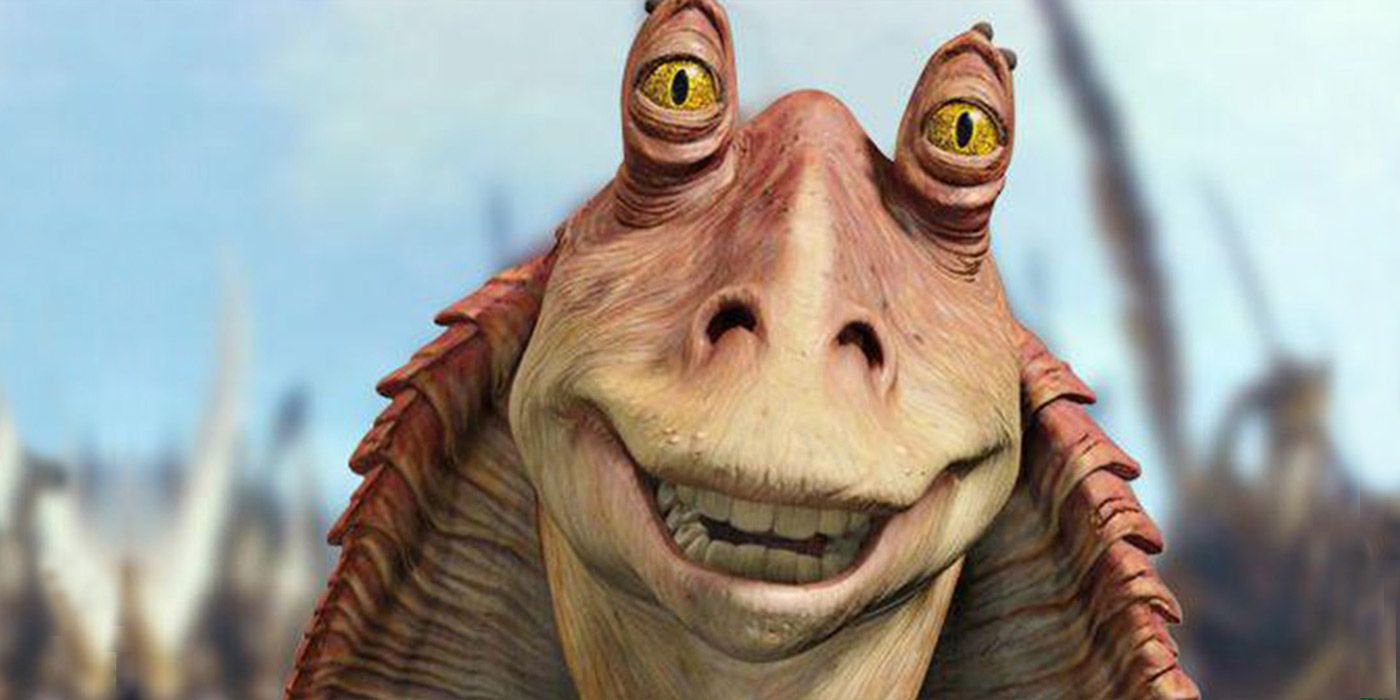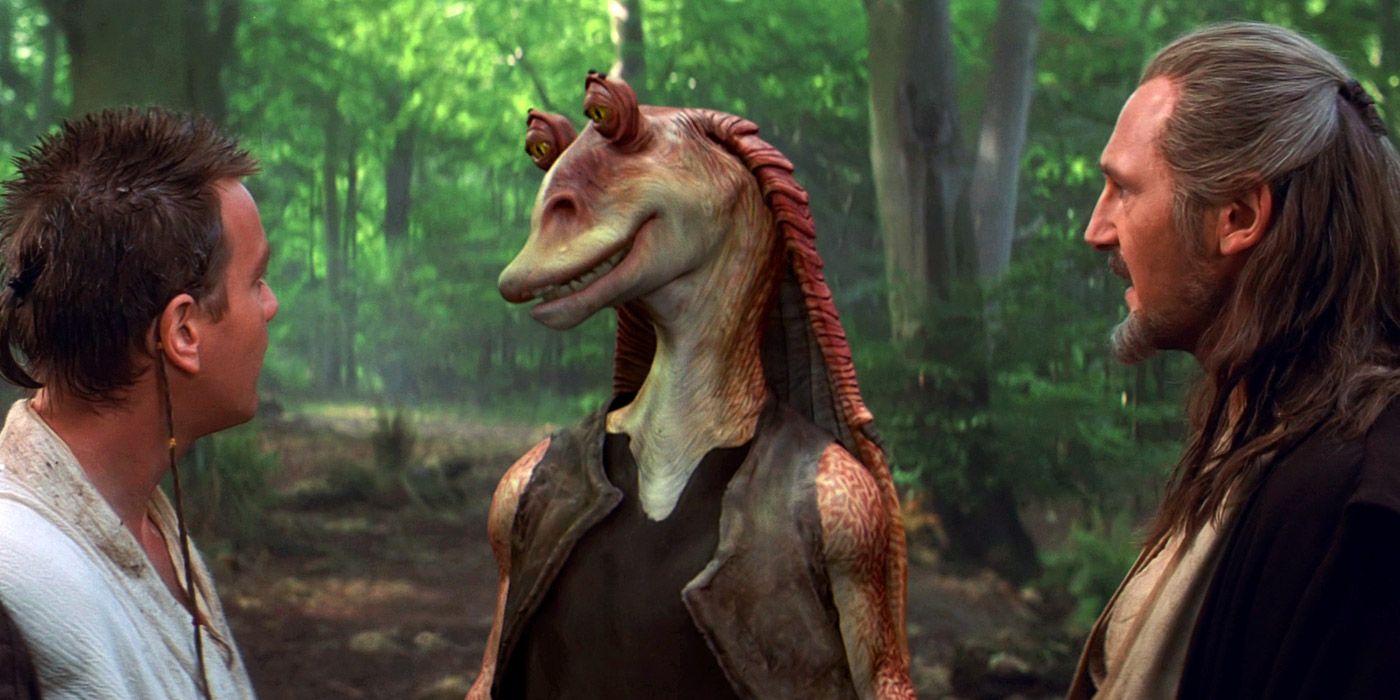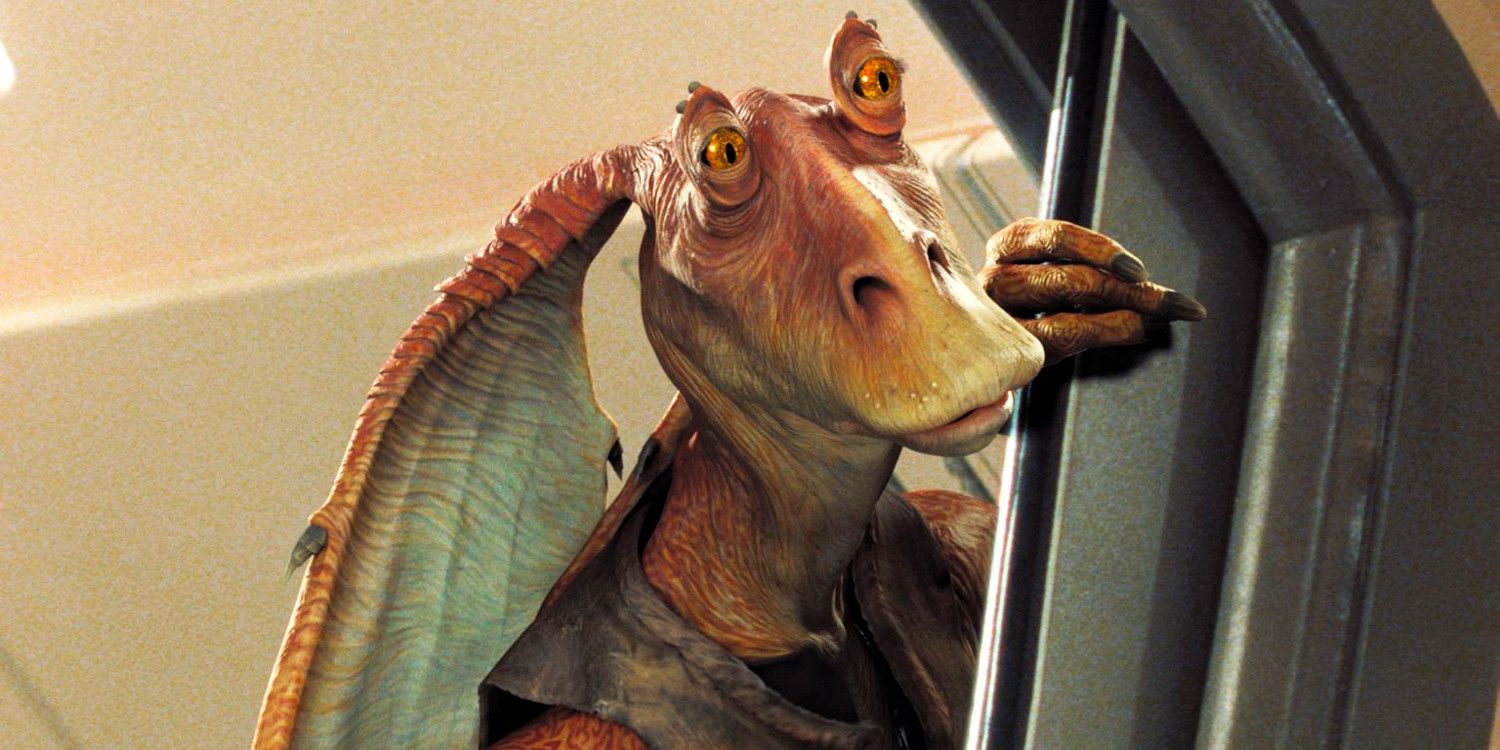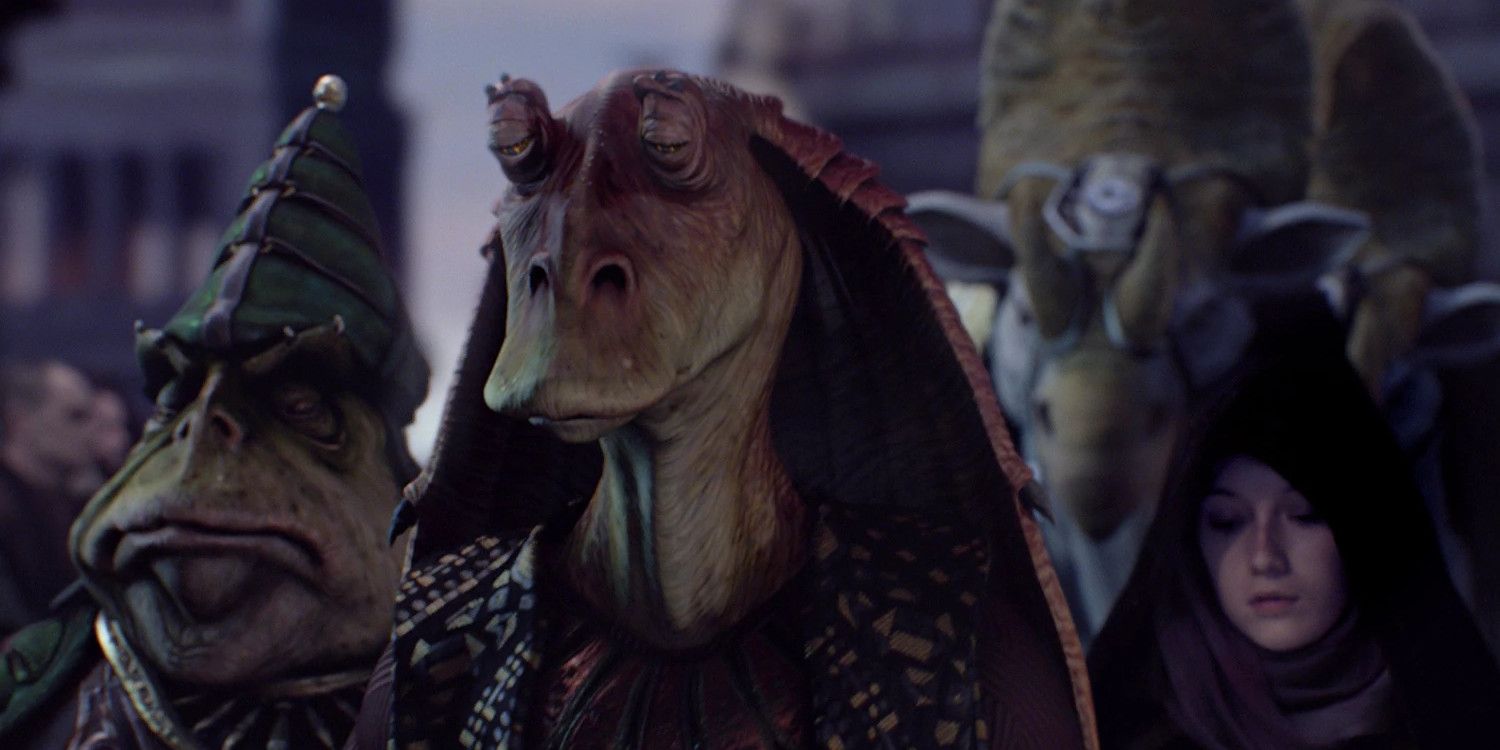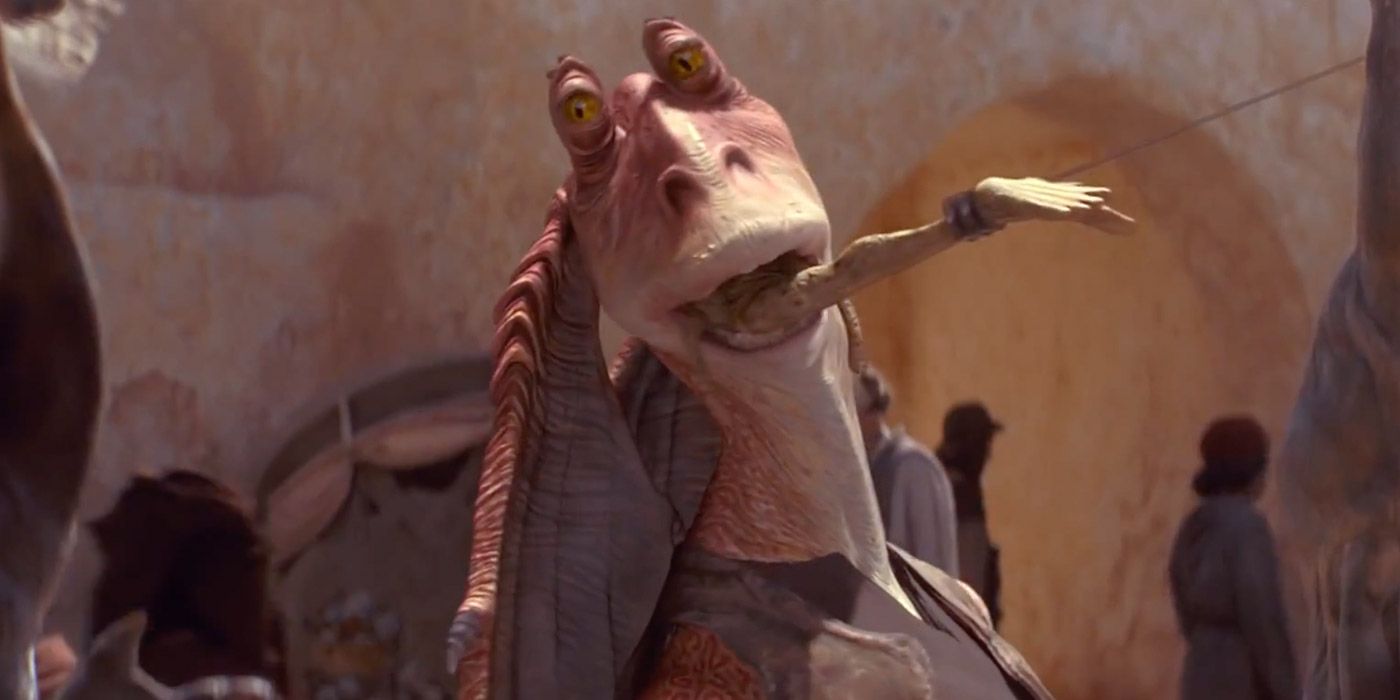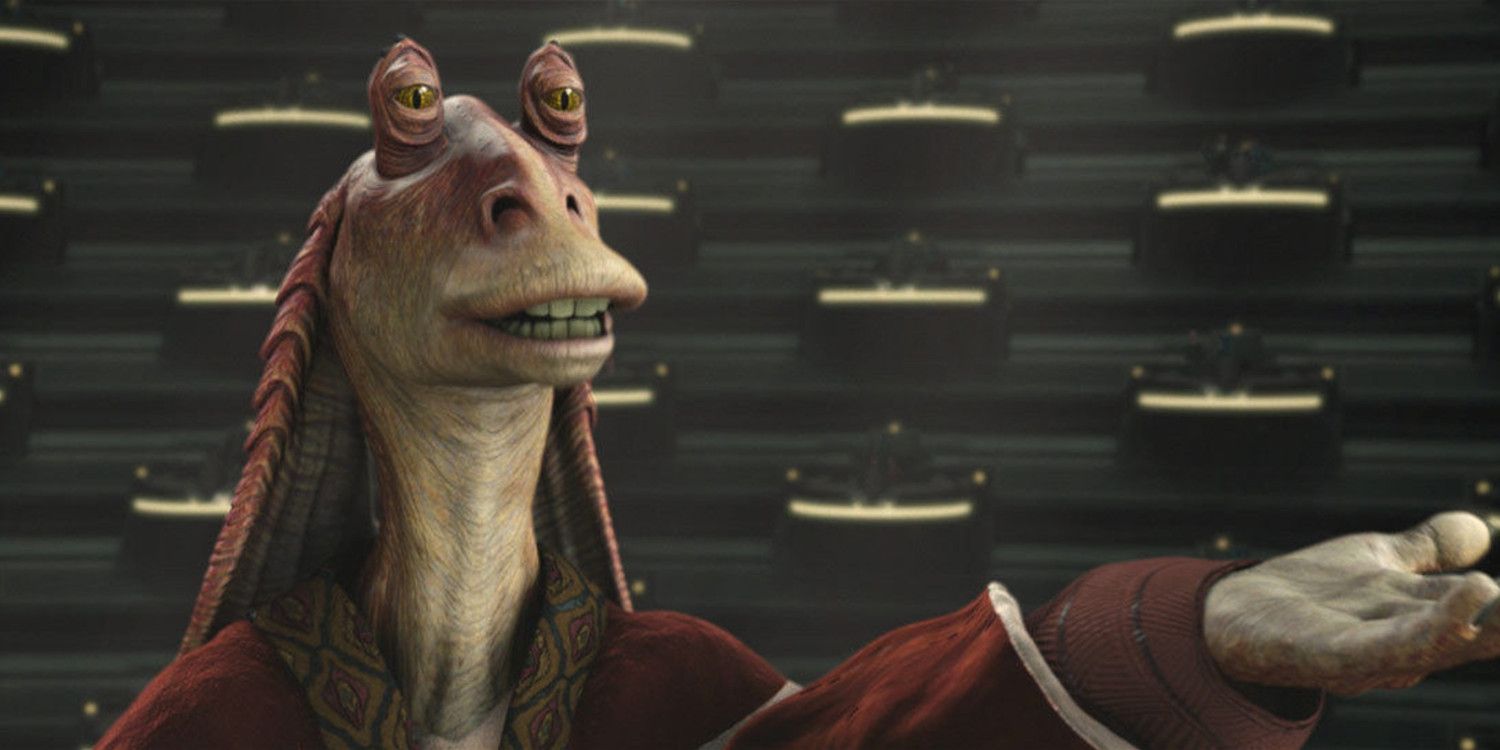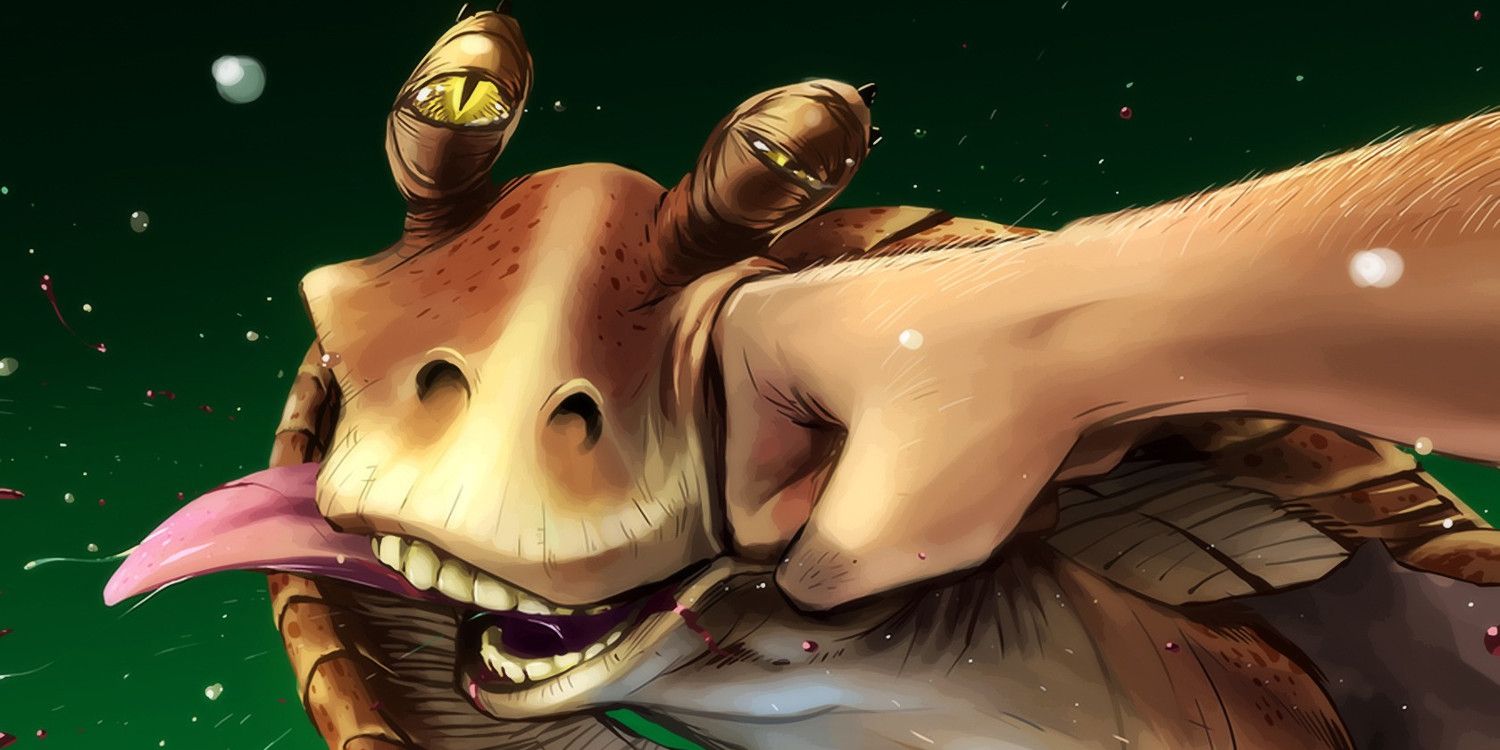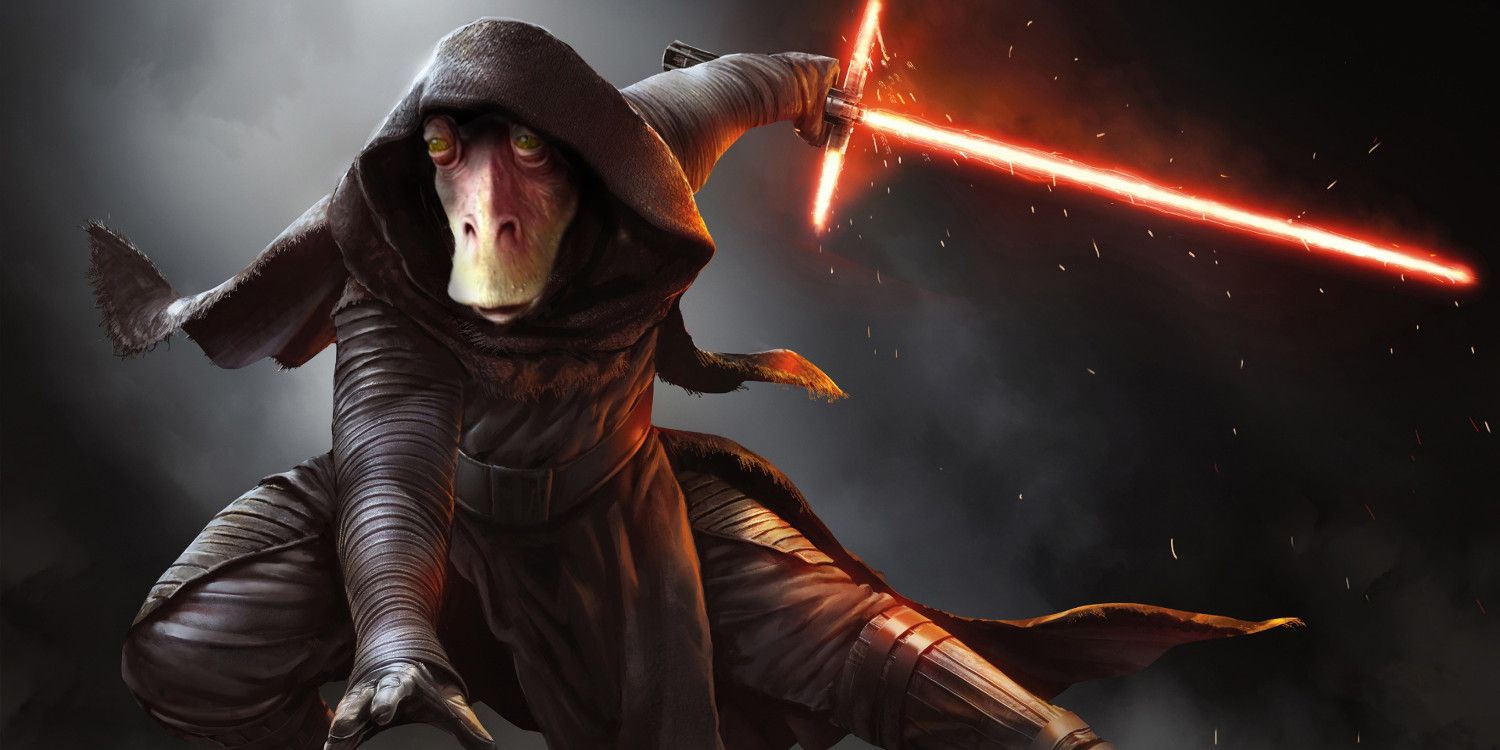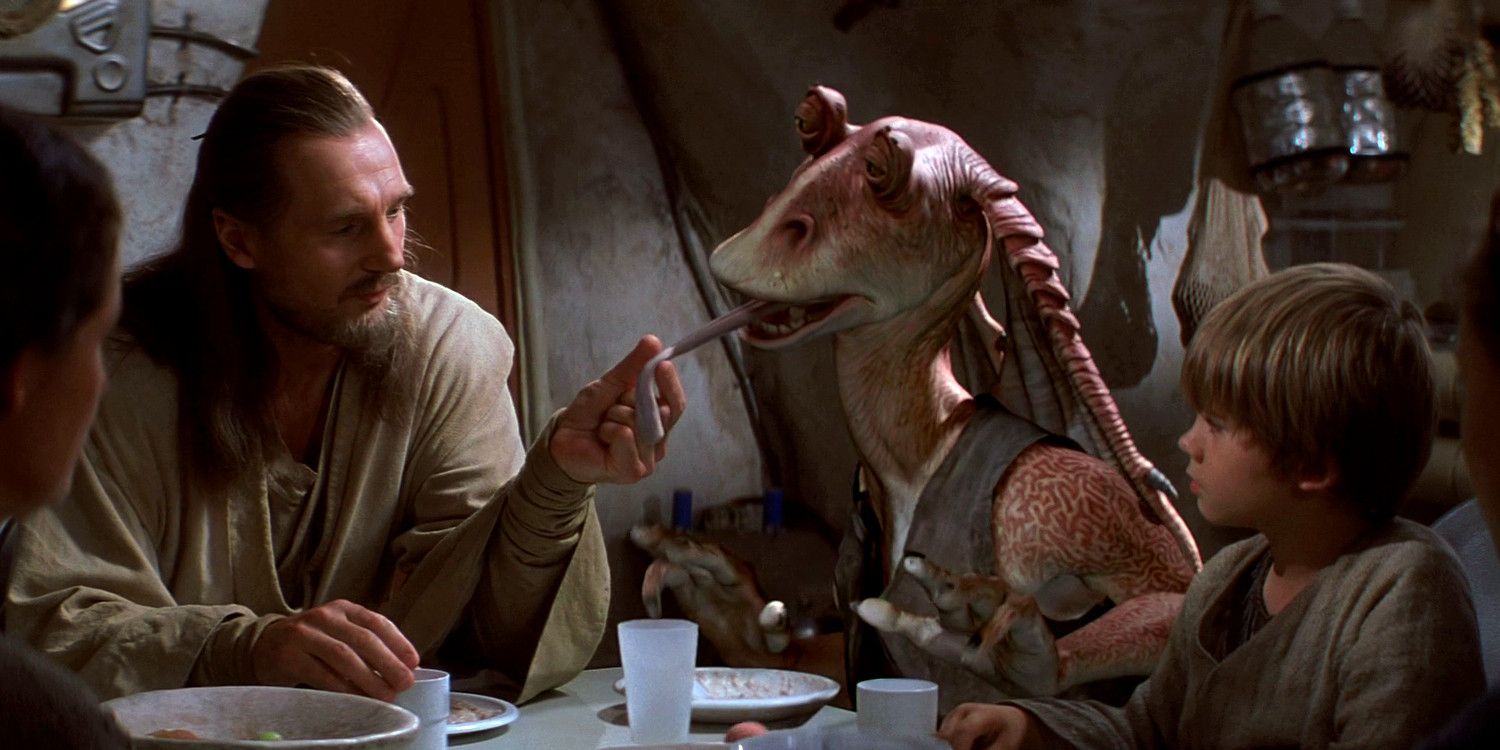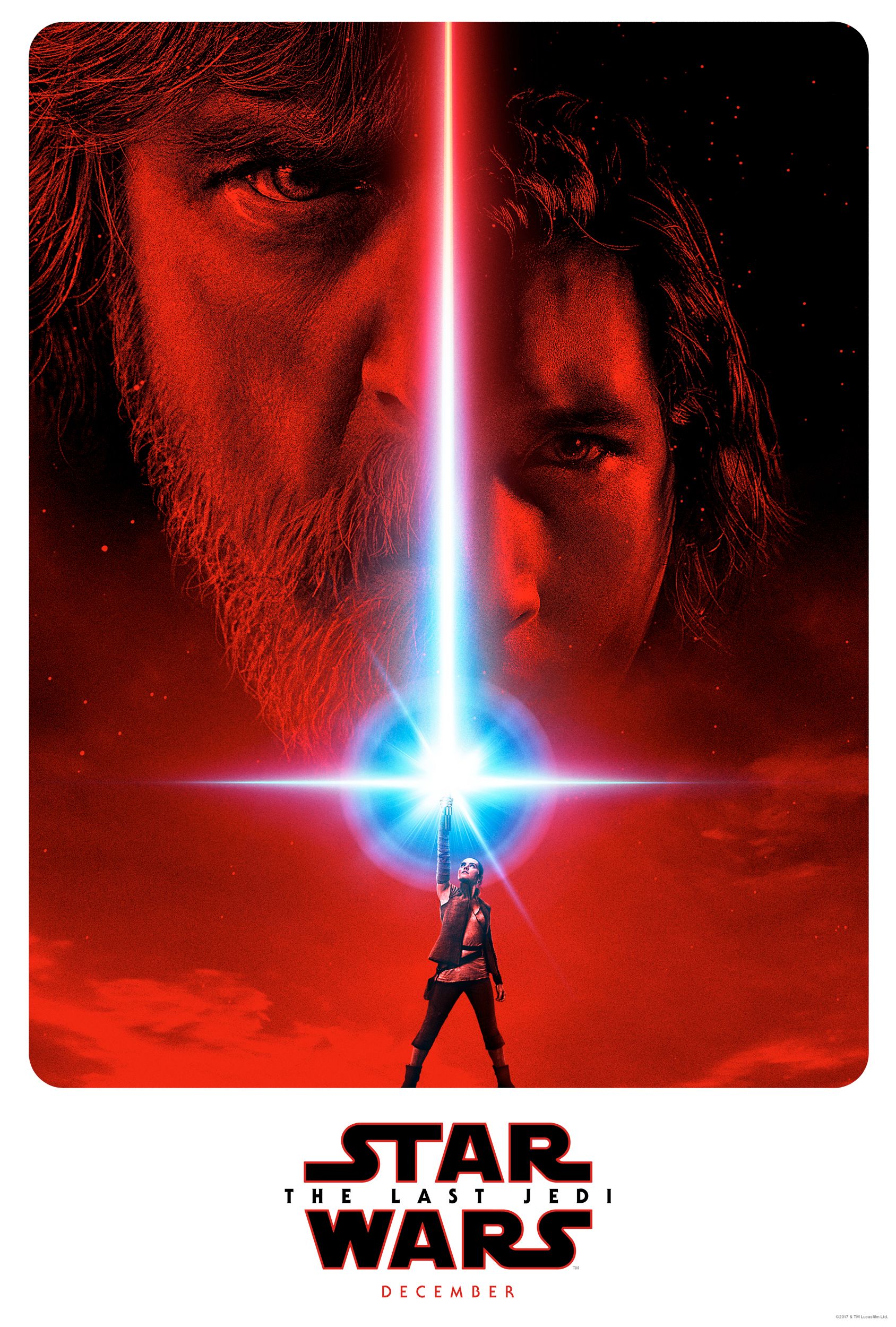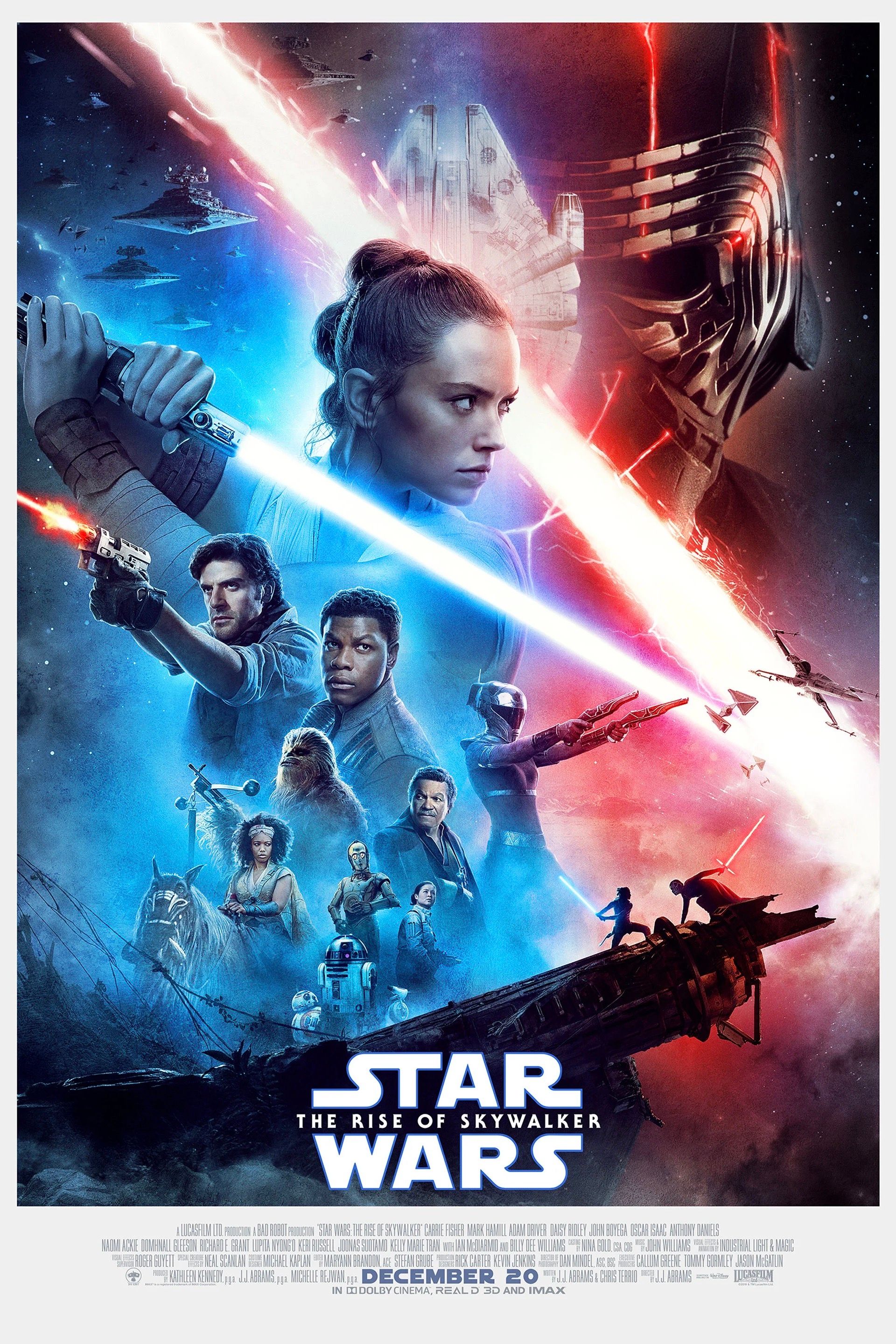Hang around Star Wars fans long enough, and you’re bound to hear something about what it means to be a “true” fan, what counts as “real” Star Wars and what doesn’t, why the originals are better than the prequels, and why you’re supposed to hate Jar Jar Binks.
While these aren’t opinions held by every fan, it’s been a fairly common voice in fandom for years, basically since the prequels came out. This kind of talk has unfortunately only become more common after Disney’s purchase of Lucasfilm, only now add fandom divisions over topics like the relegation of the Expanded Universe content to non-canon “Legends” status, or supposedly “forced” diversity in the casting of the new films, which prominently feature more women and minorities than the Star Wars of old.
The thing is, the story told by Star Wars has always contained a commentary on petty divisions of this nature, and one of the most prominent examples comes from the much maligned, and very much misunderstood, Jar Jar Binks. He may have been minimized to an internet punchline, but Star Wars fandom has a lot to learn from the despised Gungan.
The Life and Times of Jar Jar Binks
At some point before the events of The Phantom Menace, Jar Jar is banished from his Gungan home on Naboo for being, in his words, “clumsy”, but it sounds like maybe he’s sugar coating his description of events. As we would come to know, Jar Jar’s clumsiness can easily become massively destructive in the right circumstances.
When Qui-Gon Jinn and Obi-Wan Kenobi come to Naboo after the Trade Federation attempts to kill them, Qui-Gon saves Jar Jar from a Federation droid transport, causing the Gungan to declare a life debt to the Jedi Master, even though Qui Gon and Obi-Wan don’t seem to happy to have the obnoxious alien around, and Obi-Wan even calls him a “pathetic life form.”
Despite Obi-Wan’s frustrations, Jar Jar is eager to please and takes the Jedi to the Gungan city of Otoh Gunga, knowing there will be repercussions to his return from banishment. Qui-Gon even speaks up for him, using a Jedi mind trick on Boss Nass to convince him to spare Jar Jar, allowing him to accompany the Jedi as a guide.
After leaving Otoh Gunga and helping the Jedi save Queen Amidala and her attendants, Jar Jar continues on with the party, despite the Nabooians clear displeasure with him, revealing that the Gungans have long been disliked by the more civilized inhabitants of Naboo.
Even though he’s viewed as a second rate life form, Jar Jar is still eager to be useful, and when the queen returns to Naboo to take it back from the Trade Federation, he brokers a meeting between the Queen and Boss Nass, a diplomatic occurrence that was obviously rare as the two cultures had little familiarity with each other.
Impressed with Binks for being the first one to bridge the gap between the two cultures of Naboo in several generations, Boss Nass makes him a general in the coming battle. While Jar Jar clearly isn’t cut out for a military career, he is now a prominent figure with both the Gungans and the Nabooians, so he ends up becoming a senator, serving alongside Padme Amidala, who also becomes a member of the senate after her term as queen is finished.
His desire to please is eventually manipulated by Palpatine’s advisor, Mas Amedda, who convinces him that Chancellor needs emergency powers so he can have the authority to form an army. While this decision admittedly saves Padme, Anakin, Obi-Wan, and a host of Jedi on Geonosis, it also instigates The Clone Wars, which are the catalyst Palpatine needs to grow his power even more, and the key to ultimately destroying the Jedi.
The last time he’s seen in the prequels is Amidala’s funeral. It’s not clear if he knows his impact on the events that lead to that moment, but clearly, he’s devastated nonetheless.
Not much is known about his life in the intervening years, but he most recently popped up in the final book in Chuck Wendig’s Aftermath trilogy, Empire’s End. In the brief interlude, which takes place shortly after Return of the Jedi, he’s back on Naboo where he’s known as “the clown.” He works in the village square and mostly entertains children as most adults look down on him. He says they blame him for the rise of the Empire. He seems content with his simple life where he can make children laugh, but he’s still treated like a pariah by most adults.
Next: [valnet-url-page page=2 paginated=0 text='The%20Hate']
The Hate
Jar Jar-hate is something that’s been well chronicled, so it’s not super necessary to spell out in detail. Just check the comments of any Star Wars related article, or any article that connects to Star Wars in any way, there’s probably a thread in there about how much someone hates Jar Jar Binks.
The thing is, Jar Jar wasn’t created to be liked. He’s clearly despised and disrespected by just about every characterhe meets, except maybe Qui-Gon. He’s designed to be that way. Sure, maybe kids are supposed to find him entertaining, but Obi-Wan immediately hates him, his own people hate him, and they’re already seen as a less civilized culture by the Nabooians, so he’s even rejected by the rejects.
Just in case it wasn’t already especially clear that he’s supposed to be disliked, he ends up being used as one of the primary enablers of Palpatine’s rise to power. Not because he’s evil or greedy, but because he just wanted to do the right thing, only he wasn’t too bright and he was easily manipulated by Palpatine’s lackeys.
Nobody respected Jar Jar for what he was, but when he found himself in the middle of an event of galactic significance anyway, the powers that be determined that the only way he could posibly have any value is if he conformed to their ideal - to be a general or a senator. He wasn’t very good at either of those things, so he was largely disrespected and ignored, opening the door for Mas Amedda to whisper in his ear, taking advantage of his desire to help his friends.
George Lucas is famously ridiculed for stating that “Jar Jar is the key to all of this,” suggesting that he was tone deaf to what his fans wanted and introduced an unlikeable, unnecessary character, a character many say “ruined” the prequels. The thing is, Jar Jar harkens back to a major theme from the original trilogy.
When Luke first meets Yoda, he’s fooled into thinking the Jedi Master is a silly unimportant creature because in order to conform to Luke’s ideal of importance he needed to be “a great warrior.” Just like how Jar Jar was looked down on by the Gungans, the Jedi, and the Senate, who all thought the only way he could be important was if he was like them - a warrior or a politician. When he wasn’t good at either of those, they would try to minimize his significance entirely.
The Irony
Ironically, this very same thing can be seen in Star Wars fandom. After the negative response to the Star Wars prequels, fans have spent decades trying to figure out how to “fix” them. Namely by cutting the hated Gungan from the story through fan edits - but that, unfortunately, betrays the very core of the trilogy. The prequels are stories about a Jedi Order and a Galactic Republic that have become so arrogant, so self-absorbed, that they’d failed simple people of the galaxy like Jar Jar - or slaves like Anakin and his mother.
So if he can’t be removed, what about fan theories that make him better? What if he was actually a secret Sith Lord, Darth Jar Jar? That would surely fix the prequels, right? Unfortunately, this is fandom treating Jar Jar the same way everyone in the story does: “He’d be way better as a general, right?” or “He’d be way better as a Senator, right?”
Just look to the original trilogy to see this theme continue to play out. The Empire, which grew out of the Republic, clearly hasn’t improved on this front. Instead of simply losing touch with the simple folk of the galaxy, they either ignore them or enslave them, depending on the value of their planet’s resources or their labor.
It’s not until Luke meets Yoda that we see any survivors of the clone wars that learned their lesson (Obi-Wan was obviously more focused on trailing Luke, although he expresses regret over Vader). Yoda first toys with Luke, acting, well, a lot like Jar Jar. As one of the few survivors of the days of the Galactic Republic, Yoda knows their downfall came from being too quick to fight and too slow to listen to actual citizens of the galaxy besides those involved in upper class commercial or political activities - citizens like the Gungans. Luke initially fails this test. Yoda, disappointed, doesn’t even want to try to train him.
The culmination of this theme is seen in Return of the Jedi when the other most-hated part of Star Wars - the Ewoks - come into play. Once again, most of the characters on screen initially want to kill the Ewoks after they capture the Rebels on the Endor moon. Han pulls his blaster, ready to start firing, but Luke stays his hand, knowing that the creatures could be of some use. And they are, leading an instrumental charge against the shield generator, arguably becoming some of the biggest heroes of the whole war, proving the biggest weakness of the Emperor and his Empire was hubris.
In the same way that fans talk about “fixing” Jar Jar, fans also look for ways to rationalize the Ewoks, frequently pointing out that they should have been Wookiees, seeking to satisfy their ideal of what heroes look like. Some fan theories even say all the Ewoks died due to Death Star debris falling onto the Endor moon, giving fans some sort of satisfaction or feeling of “revenge” for the creatures polluting what their Star Wars story “should” have been. But just like how making Jar Jar a Sith Lord or removing him entirely betrays the purpose of the prequels, taking away the Ewoks does the same to RotJ.
We love it when an inexperienced farmboy from a backwater planet outmaneuvers Darth Vader to land a seemingly impossible shot to destroy the Death Star, yet we hate it when teddy bears defeat an army of Stormtroopers. Both seem equally implausible, but the former is accomplished by a human, someone we can identify with, while the latter is conducted by beings we don’t understand or appreciate. It’s difficult to vicariously enjoy the victory over the Empire and fans feel the satisfaction of seeing this done “right” was stolen from them. Their ideal hero isn’t the one that saves the day and that makes it somehow “wrong”.
Next: [valnet-url-page page=3 paginated=0 text='Conclusion']
Conclusion
Going back to Jar Jar: when Aftermath: Empires End revealed his not so noble end as a clown, many fans excitedly though this was Lucasfilm finally kicking Jar Jar to the curb, degrading him and finally fulfilling the wishes some fans have had for decades of seeing the Gungan humiliated. What they were actually doing, though, was turning a mirror on the fandom. As always, Jar Jar was being treated in the story the same way fans treated him in the real world. He was the butt of the joke, at his expense - and despite his best effort.
From a broader perspective, the parts of the Star Wars saga fans don’t particularly love are treated similarly, especially the prequels. They don’t live up to fan expectations or standards for what makes something a Star Wars movie, so they endlessly obsess over how to remove the less satisfactory elements through fan edits or just outright dismiss them, saying they consider them non-canon or asking Disney to ignore them in future movies.
In the same way that Jar Jar Binks failed to live up to the expectations of more cultured societies, and the Ewoks failed to live up to the definition of war heroes - the Star Wars prequels failed to check off all the expectations of fans. In their nostalgic obsession with the “real action” of the saga, they disregarded a core pillar. Even in our fandom, we forget the little guy. We’re missing the point.
That’s not to say fans are wrong if they dislike the prequels - or any part of Star Wars, really. Everyone is free to enjoy whatever entertainment they prefer! But to disparage any piece of the Star Wars saga because the story or characters aren’t catered toward specific sensibilities - be it a disagreement on story direction or the ethnicity or gender of the characters - is pretty reductive.
Like Jar Jar’s treatment in Empire’s End, fans with these issues can disparage the parts of Star Wars they find issue with - or they can approach them in a new light, and perhaps try to appreciate how that story might resonate with people of different backgrounds. Maybe we can even learn something about ourselves - and how we treat those who are different from us - in the process.

